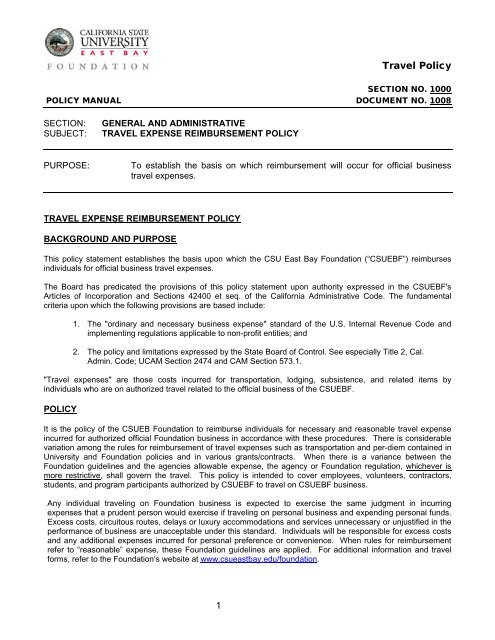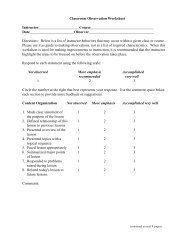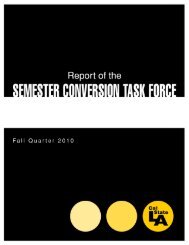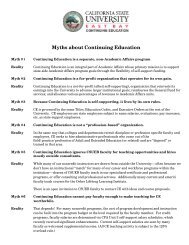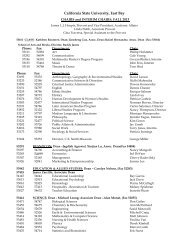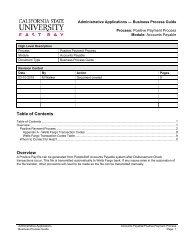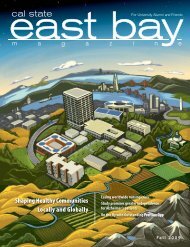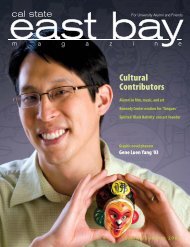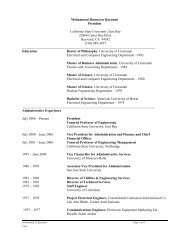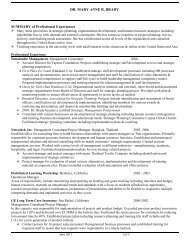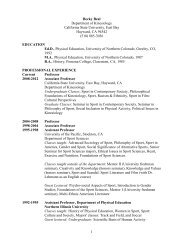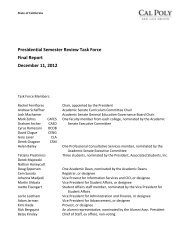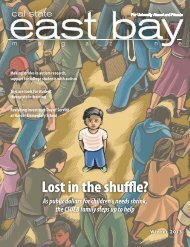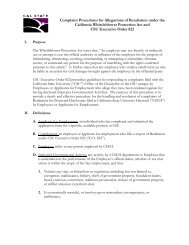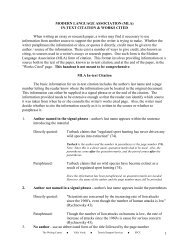Foundation Travel Policy Manual - California State University, East ...
Foundation Travel Policy Manual - California State University, East ...
Foundation Travel Policy Manual - California State University, East ...
You also want an ePaper? Increase the reach of your titles
YUMPU automatically turns print PDFs into web optimized ePapers that Google loves.
<strong>Travel</strong> <strong>Policy</strong>SECTION NO. 1000POLICY MANUAL DOCUMENT NO. 1008SECTION:SUBJECT:GENERAL AND ADMINISTRATIVETRAVEL EXPENSE REIMBURSEMENT POLICYPURPOSE:To establish the basis on which reimbursement will occur for official businesstravel expenses.TRAVEL EXPENSE REIMBURSEMENT POLICYBACKGROUND AND PURPOSEThis policy statement establishes the basis upon which the CSU <strong>East</strong> Bay <strong>Foundation</strong> (“CSUEBF”) reimbursesindividuals for official business travel expenses.The Board has predicated the provisions of this policy statement upon authority expressed in the CSUEBF'sArticles of Incorporation and Sections 42400 et seq. of the <strong>California</strong> Administrative Code. The fundamentalcriteria upon which the following provisions are based include:1. The "ordinary and necessary business expense" standard of the U.S. Internal Revenue Code andimplementing regulations applicable to non-profit entities; and2. The policy and limitations expressed by the <strong>State</strong> Board of Control. See especially Title 2, Cal.Admin. Code; UCAM Section 2474 and CAM Section 573.1."<strong>Travel</strong> expenses" are those costs incurred for transportation, lodging, subsistence, and related items byindividuals who are on authorized travel related to the official business of the CSUEBF.POLICYIt is the policy of the CSUEB <strong>Foundation</strong> to reimburse individuals for necessary and reasonable travel expenseincurred for authorized official <strong>Foundation</strong> business in accordance with these procedures. There is considerablevariation among the rules for reimbursement of travel expenses such as transportation and per-diem contained in<strong>University</strong> and <strong>Foundation</strong> policies and in various grants/contracts. When there is a variance between the<strong>Foundation</strong> guidelines and the agencies allowable expense, the agency or <strong>Foundation</strong> regulation, whichever ismore restrictive, shall govern the travel. This policy is intended to cover employees, volunteers, contractors,students, and program participants authorized by CSUEBF to travel on CSUEBF business.Any individual traveling on <strong>Foundation</strong> business is expected to exercise the same judgment in incurringexpenses that a prudent person would exercise if traveling on personal business and expending personal funds.Excess costs, circuitous routes, delays or luxury accommodations and services unnecessary or unjustified in theperformance of business are unacceptable under this standard. Individuals will be responsible for excess costsand any additional expenses incurred for personal preference or convenience. When rules for reimbursementrefer to “reasonable” expense, these <strong>Foundation</strong> guidelines are applied. For additional information and travelforms, refer to the <strong>Foundation</strong>’s website at www.csueastbay.edu/foundation.1
4. Incidentals $ 5.00Actual Expenses with receipts if less than Per Diem are acceptable. Original receipts must besubmitted with the travel claim form for reimbursement using this method. <strong>Travel</strong>ers may bereimbursed for actual meal expenses up to the maximum allowance of per-diem for each individualmeal.Employees may choose one of the above methods and that method of reimbursement must be usedfor the entire trip.B. Pre-paid MealsPer diem may not be claimed for meals that are already included in the cost of airfare, conference, orother fees (i.e. if lunch is provided in the airplane, traveler cans only claim breakfast and dinner).C. <strong>Travel</strong> StatusTo receive an allowance for all three meals and incidentals, a traveler must be on travel status for afull 24-hour period. Figure a 24-hour period from the time of departure on day one to the same timeon day two, and to the same time on each succeeding day. (Note: The time of departure on travelclaims may start when you leave your residence for the airport.)For travel that is a fractional part of a period of travel of more than 24 hours, the maximumauthorized allowance for meals is as follows:1. If the travel extends past 9 a.m., breakfast;2. If the travel extends past 2 p.m., lunch;3. If the travel extends past 6 p.m., dinner.For travel which is less than 24 hours in duration, the above stated allowance may be claimed for:breakfast if the travel begins before 7 a.m.; dinner if the travel extends past 6 p.m.; lodging if thetravel extends overnight. Expenses must be incurred more than 25 miles from the individual’s normalwork location, except that an individual who travels by air may claim breakfast or dinner if the hoursinvolved are before 7 a.m. or after 6 p.m. Individuals who travel for less than 24 hours may not claimany lunch allowance.Individuals on long-term travel status of more than 31 days or on continuous, indeterminate fieldassignment should contact the <strong>Foundation</strong>’s Grants & Contracts Manager or Accounting Office fortravel regulations applicable to their circumstances.III. FOREIGN TRAVEL (<strong>Travel</strong> outside of the Continental United <strong>State</strong>s)A. Short-Term per Diem AllowanceFor continuous foreign travel for 24 hours or more, meal and incidental allowances are authorized onthe basis of the rates established by the Secretary of <strong>State</strong> and published in “Maximum <strong>Travel</strong> PerDiem Allowances for Foreign Areas” at www.gsa.gov. If the specific city of travel is not listed, the“other” per diem rate for that country will apply. Documentation of requirements are as follows:1. Lodging: An original receipt is required to support all the lodging expenses for which anallowance is claimed. The traveler will be reimbursed only for his/her actual lodging costs.2. Meals & Incidentals: Meals and incidentals while on international travel shall be reimbursedat actual expense up to U.S. <strong>State</strong> Department rate in effect at the time of travel for thespecific foreign location (http://aoprals.state.gov/web920/per_diem.asp. After selectingcountry, see “M&IE Rate”, column six) in accordance with the breakdown in FTR Appendix B(http://aoprals.state.gov/content.asp?content_id=114&menu_id=89).All other requirements for receipts and documentation shall apply as per non-foreign travel.3
2. Check Request Form with documentation justifying need for advance payment. Advancepayments are made directly by the <strong>Foundation</strong> to the payee, these amounts will not beadvanced to the traveler.B. <strong>Travel</strong> AdvanceBefore requesting a travel advance, the proposed travel must be approved via the <strong>Foundation</strong> <strong>Travel</strong>Pre-approval and Claim Form process. <strong>Travel</strong> advances may only be requested if estimated travelcosts will exceed $500 ($100 for students). A travel advance may be requested by submitting a<strong>Foundation</strong> Check Request to the SRP Office. The check request must be submitted at least 10business days prior to the start of the travel. The amount of the travel advance requested may notexceed 80% of the total estimated cost of the trip as set forth in the approved travel pre-approvalform. Unless required to secure a discounted rate, no advances shall be issued earlier than 30 daysbefore the start of the planned travel. <strong>Travel</strong> advances may not be issued to an individual who hasoutstanding travel advances. The advance must be returned or refunded immediately when a trip iscancelled or postponed. The traveler is personally responsible for clearing the advance. Outstandingadvances may be reported to the IRS as income via IRS Form 1099.VII. VEHICLE USAGEA. Operator RequirementsAll individuals who drive on official <strong>Foundation</strong> business using a personal, <strong>Foundation</strong> owned, orrental vehicle MUST:1. Possess a valid driver’s license appropriate to the type of vehicle operated and have thecurrent driver’s license on file.2. Use and ensure all passengers’ use all available safety equipment in the vehicle.3. File annually the Authorization to use Privately Owned Vehicle Form (Exhibit B), which statesthat the driver is covered by the minimum prescribed liability insurance.4. Possess current insurance equal to the minimum coverage prescribed by the <strong>California</strong>Vehicle Code and must have a current copy of their insurance ID card with expiration on filewith the <strong>Foundation</strong>.5. Have completed the <strong>Foundation</strong> Defensive Driving course online within the past three years.B. Private vehiclesReimbursement for use of an individual’s privately owned vehicle is determined under different ratesand conditions as follows:1. Where claimant is authorized to operate a privately owned automobile, the <strong>State</strong> of <strong>California</strong>reimbursement rate per mile (as of January 31 st of the current calendar year) is allowable forauthorized mileage reimbursement. If the traveler can use air travel, but chooses instead touse a private vehicle, he/she will be reimbursed at the approved mileage rate or theequivalent of a round-trip airfare, whichever is less. The SRP Director or Accounting Officewill determine the average cost of round-trip airfare. Justification for the use of a privatevehicle must be included with the travel reimbursement claim. The traveler may not receiveper diem for the excess time spent traveling via private vehicle as compared to the air traveltime to the same destination.The rates of reimbursement for mileage include the cost of maintaining liability insurance atthe minimum amount prescribed by law and collision insurance sufficient to cover thereasonable value of the vehicle, less a standard deductible. In the event of an accident, the<strong>Foundation</strong>’s insurance coverage is only applicable if the traveler’s liability exceeds his/herpersonal liability insurance coverage. Insurance carriers normally allow the occasional use ofprivately owned vehicles for business trips without an increase in the premium rates. If aprivate vehicle is regularly used on project business, the traveler should notify his/herinsurance carrier.5
2. City and state to which the call was placed;3. Time and date of call;4. Reason for call.G. Emergency PurchasesIf emergency equipment or supply purchases are required for the completion of the official<strong>Foundation</strong> business it shall be explained in writing. If the emergency purchase exceeds $15, it mustbe approved by the traveler’s supervisor in advance.VIII. DOCUMENTATION OF TRAVEL EXPENSEA. ReceiptsReceipts shall be submitted for every item of expenses except:1. Meal allowances, except when specified2. Street car, Bus, ferry fares, bridge tolls, road tolls and BART.3. Taxi fares under $25.4. Parking fees of $5.00 or less for any one continuous period of parking.B. Lost ReceiptsIn cases where receipts cannot be obtained or have been lost, a statement to that effect shall bemade on the travel claim and the reason given. In the absence of a satisfactory explanation, the itemwill be disallowed.C. Receipt CopyIf, for some reason, a copy of the receipt must be submitted instead of the original, state the reasonon the claim. In the absence of a satisfactory explanation, the item will be disallowed.D. Expense Shared with Other OrganizationsWhere expenses are being shared with an external organization, a copy of the receipts will suffice ifsubmitted with a copy of expense report used to reconcile travel with the other party, or a commonexpense report showing all expenses being charged to both the <strong>Foundation</strong> and the otherorganization.IX. TRAVEL EXPENSE CLAIM FORM PREPARATIONA. Due Date<strong>Travel</strong> claims are due within 30 days from the date on which the travel terminated. <strong>Travel</strong> claimssubmitted after 30 days may be disallowed if i) the travel is funded by a grant or contract, and ii) thegrant or contract has been closed or will not pay delinquent claims. <strong>Travel</strong> claims funded by othersources may have other restrictions which may lead to denial of delinquent claims.B. Column Entries1. Date- Enter month, day and year when travel was performed2. Time- Enter time of day, using the 24-hour clock, of departure and return3. Destination, Type of Transportation- Enter location where expense was incurred and the typeof transportation used. Include “and return” if round trip4. Subsistence- Enter appropriate per diem allowances for each day5. Transportation Costs- Enter purchase cost of transportation, toll, parking, etc.6. Business Expense- Show detail on travel expense claim7. Private Car Use- Enter the number of miles driven and totalC. Purpose or Objective of TripEach employee must state the purpose or objective of the trip for which reimbursement is claimed.D. SignaturesClaimant must personally sign the travel claim and have his/her supervisor approve the claim.7
PROCESSA. It is necessary and prudent for the Board of Directors to provide for exceptions to the general policy on travelexpense reimbursements because:1. The general policy rules and rates are expressed in rigid terms which, if applied in all circumstances,might not be equitable or cost effective; and2. <strong>State</strong> law authorizes the Board of Control to exercise discretion in the waiving of its rules whenspecial circumstances warrant, but there is no mechanism for the CSUEBF to obtain such waivers fornon-state transactions.B. The CSUEBF Board of Directors delegates to the Executive Director the authority to develop and allowexceptions to the above general policy on rates and rules in such cases where the Executive Director, underimplementing guidelines, determines that circumstances warrant an exception on grounds of either costeffectiveness or equity.C. Such exceptions should relate to the nature of the travel (e.g., <strong>University</strong> academic program; federalgrant/contract; public relations/development, corporate administration unrelated to <strong>University</strong> functions), mayoccasionally involve special classifications of allowable costs, but will more likely involve authorizingreimbursements at the rate of actual costs, rather than applying the general rates. This exception principle isrecognized by the <strong>State</strong> Board of Control regulations. See Cal. Admin. Code Sec. 708.D. The Executive Director is authorized to establish, with concurrence of the Board, management guidelinesconsistent with and in implementation of this policy statement.8


